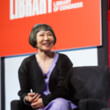Family trust: a novel
Description
“A globe-trotting, whirlwind, tragi-comic family saga that wrings tears from absurdity and laughter from loss. A joy to read from start to finish.” — Andrew Sean Greer, author of Less, winner of the 2018 Pulitzer Prize
The Nest meets Crazy Rich Asians in this sharp comedic novel about a Chinese-American family's attempts (or not) to fulfill its dying patriarch's final bequest.
Some of us are more equal than others....
Meet Stanley Huang: father, husband, ex-husband, man of unpredictable tastes and temper, aficionado of all-inclusive vacations and bargain luxury goods, newly diagnosed with pancreatic cancer.
Meet Stanley's family: son Fred, frustrated that his years of academic striving (Harvard MBA!) haven't protected him from career stagnation; daughter Kate, balancing a capricious boss, a distracted husband, and two small children; ex-wife Linda, familiar with and suspicious of Stanley's grandiose ways; and second wife Mary, giver of foot rubs and ego massages.
For years, Stanley has insistently claimed that he's worth a small fortune. Now, as the Huangs come to terms with Stanley's approaching death, they are also starting to fear that Stanley's "small fortune" may be more "small" than "fortune." A "study in the difference between expectation and reality" (npr.org), a bittersweet rumination on what we owe our families, and a sharp-eyed look at Silicon Valley's culture of excess, Family Trust is a "dryly cynical" (Globe and Mail) satire of the American dream.
More Details
9780062866257
9780062855275
Similar Titles From NoveList
Similar Authors From NoveList
Published Reviews
Booklist Review
Wang's sardonic first novel dissects the role of class and the quest for money in Silicon Valley from the points of view of five members of the Huang family. Patriarch Stanley, who has hinted that he's worth millions, is dying of pancreatic cancer, and his prospective heirs are genteelly probing to see how much they might profit by his death. Stanley's marginally successful venture capitalist son Fred would like more respect from his peers, while daughter Kate, a middle manager and harried housewife, wants some relief from her constant stress, and Stanley's second wife, Mary, feels that she deserves a reward for years of catering to him. Stanley's first wife, Linda, doesn't expect anything for herself, but she's fierce in her desire that her children get their due. While Wang tosses out more plot threads than she finally reels in, and the connections among the stories of the five characters aren't always as apparent as they might be, she explores Silicon Valley subculture with wit and ultimately reveals a deep understanding of her feckless strivers.--Margaret Quamme Copyright 2018 Booklist
Publisher's Weekly Review
A Taiwanese-American family faces the realities and indignities of living in Silicon Valley in Wang's astute debut. Stanley Huang is dying of pancreatic cancer and his reassurances to his family about his millions in savings are falling on increasingly suspicious ears. His first wife, Linda, received nearly nothing in her divorce and is determined that her children have more financial support than she received. As Stanley's health deteriorates, his far younger second wife, Mary Zhu, becomes frustrated with caring for him. Meanwhile, Stanley and Linda's son, Fred, toils as a middle manager in an investment firm and waits for a promotion that will surely make his career. Their daughter, Kate, suffers under a high-maintenance boss at a multinational tech company and has two young kids and a husband who works at a start-up that hasn't started up. Everyone in the family agrees: the money Stanley has vaguely promised them would be a huge relief. But as they attempt to secure their inheritances, questions emerge: How much of Stanley's respect have their loyalties and successes won? Who is acting in Stanley's best interest? And what will life look like after Stanley dies? The author brings levity and candor to the tricky terrain of family dynamics, aging, and excess. Wang's debut expertly considers the values of high-tech high society. (Oct.) © Copyright PWxyz, LLC. All rights reserved.
Library Journal Review
DEBUT Stanley Huang is dying of cancer. He is the patriarch of a first-generation Chinese American family, all of whom have been successful in Silicon Valley. Then again, their achievements are questionable. His daughter Kate and son Fred are both dealing with failed marriages. His second wife, Mary, wants to make sure she inherits as much as possible, while his first wife, Linda, worries about her children's inheritances. Everyone is jockeying for Stanley's pile of money, which may or may not exist. As Stanley's health continues to deteriorate, Fred loses his job, Kate discovers her husband's mistress, Linda meets a man on an online dating site, and Mary searches through Stanley's files for bank statements and credit cards. While many are comparing this novel to Kevin Kwan's Crazy Rich Asians, it's much more about family relationships than about the wealth the Huang family displays. It's also about the machinations of Silicon Valley, where start-ups fight one another for proprietary rights and scam artists are constantly working the Internet. VERDICT Readers who enjoy complicated novels about family issues will find this engrossing work impossible to put down. [See Prepub Alert, 4/9/18.]-Andrea Kempf, formerly with Johnson Cty. Community Coll. Lib., Overland Park, KS © Copyright 2018. Library Journals LLC, a wholly owned subsidiary of Media Source, Inc. No redistribution permitted.
Kirkus Book Review
Members of a Chinese-American family based in Silicon Valley deal with the passing of their patriarch.As news of Stanley Huang's bleak diagnosis settles in, his ex-wife and adult children all face other complications in their lives. Linda Liang, 72, has been enjoying peace and quiet since her divorce from the ill-tempered Stanley. Always the brains of the outfit, she continues to ensure her comfort with smart investments and, now, a subscription to a high-end online dating service. Her fear is that whatever resources Stanley has managed to hang on to are being cornered by his young second wife, Mary Zhu, who caters to him with foot rubs and indulgent meals that she may well realize are doing nothing for his longevity. Meanwhile, offspring Fred and Kate, like debut novelist Wang, belong to a generation of Chinese-Americans grappling with the complicated effects of their high achievement and assimilation. Fred, groomed for success with a Harvard Business School degree, has gotten stuck at a middling firm where he's making a mere $325,000 per year. The woman who's hoping to be his second wife is another gold digger, a Hungarian beauty with a job selling jewelry at Saks. Fred's vistas open up when he gets an email from a former classmate: "Jack Hu, the lone male scion of a billionaire family in Hong Kong. They shared a circle because they were both Asian men, a minority whose numbers at Harvard were carefully and deliberately contained each year by the administration." Invited for the first time to the Founders' Retreat, a luxurious networking opportunity for captains of industry, Fred is determined to do whatever it takes to cash in. Back home, his sister, Kate, is suffering from Superwoman syndrome: Her paycheck supports her family of four, but she also carries the heavier burden as both parent and child. And she's about to find out what her entrepreneur husband really does all day.Wang speaks with authority, insight, and irony about the ethnic and socio-economic realities at business school, in Silicon Valley, in mixed-race relationships and marriages. A strong debut. Copyright Kirkus Reviews, used with permission.
Booklist Reviews
Wang's sardonic first novel dissects the role of class and the quest for money in Silicon Valley from the points of view of five members of the Huang family. Patriarch Stanley, who has hinted that he's worth millions, is dying of pancreatic cancer, and his prospective heirs are genteelly probing to see how much they might profit by his death. Stanley's marginally successful venture capitalist son Fred would like more respect from his peers, while daughter Kate, a middle manager and harried housewife, wants some relief from her constant stress, and Stanley's second wife, Mary, feels that she deserves a reward for years of catering to him. Stanley's first wife, Linda, doesn't expect anything for herself, but she's fierce in her desire that her children get their due. While Wang tosses out more plot threads than she finally reels in, and the connections among the stories of the five characters aren't always as apparent as they might be, she explores Silicon Valley subculture with wit and ultimately reveals a deep understanding of her feckless strivers. Copyright 2018 Booklist Reviews.
Library Journal Reviews
Terminally ill and reputedly worth millions, Stanley Huang has his Silicon Valley-based family in an emotional tangle. Caretaking second wife Mary is harried, first wife Linda wants her children to get a big slice of the pie, son Fred could use some cash, and daughter Kate is crushed by tending to everyone but herself. A big debut with a 200,000-copy first printing.
Copyright 2018 Library Journal.Library Journal Reviews
Stanley Huang is dying of cancer. He is the patriarch of a first-generation Chinese American family, all of whom have been successful in Silicon Valley. Then again, their achievements are questionable. His daughter Kate and son Fred are both dealing with failed marriages. His second wife, Mary, wants to make sure she inherits as much as possible, while his first wife, Linda, worries about her children's inheritances. Everyone is jockeying for Stanley's pile of money, which may or may not exist. As Stanley's health continues to deteriorate, Fred loses his job, Kate discovers her husband's mistress, Linda meets a man on an online dating site, and Mary searches through Stanley's files for bank statements and credit cards. While many are comparing this novel to Kevin Kwan's Crazy Rich Asians, it's much more about family relationships than about the wealth the Huang family displays. It's also about the machinations of Silicon Valley, where start-ups fight one another for proprietary rights and scam artists are constantly working the Internet. VERDICT Readers who enjoy complicated novels about family issues will find this engrossing work impossible to put down. [See Prepub Alert, 4/9/18.]—Andrea Kempf, formerly with Johnson Cty. Community Coll. Lib., Overland Park, KS
Copyright 2018 Library Journal.Publishers Weekly Reviews
A Taiwanese-American family faces the realities and indignities of living in Silicon Valley in Wang's astute debut. Stanley Huang is dying of pancreatic cancer and his reassurances to his family about his millions in savings are falling on increasingly suspicious ears. His first wife, Linda, received nearly nothing in her divorce and is determined that her children have more financial support than she received. As Stanley's health deteriorates, his far younger second wife, Mary Zhu, becomes frustrated with caring for him. Meanwhile, Stanley and Linda's son, Fred, toils as a middle manager in an investment firm and waits for a promotion that will surely make his career. Their daughter, Kate, suffers under a high-maintenance boss at a multinational tech company and has two young kids and a husband who works at a start-up that hasn't started up. Everyone in the family agrees: the money Stanley has vaguely promised them would be a huge relief. But as they attempt to secure their inheritances, questions emerge: How much of Stanley's respect have their loyalties and successes won? Who is acting in Stanley's best interest? And what will life look like after Stanley dies? The author brings levity and candor to the tricky terrain of family dynamics, aging, and excess. Wang's debut expertly considers the values of high-tech high society. (Oct.)
Copyright 2018 Publishers Weekly.





























